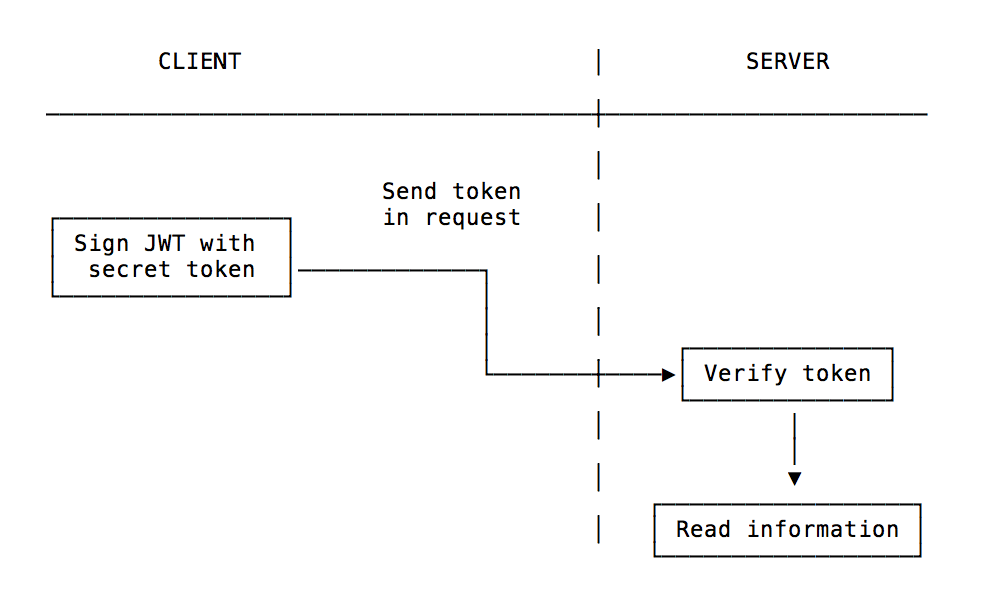JSON Web Token (JWT) explained
Learn the basics of JWT and how to use them
JSON Web Token is a standard used to create access tokens for an application.
It works this way: the server generates a token that certifies the user identity, and sends it to the client.
The client will send the token back to the server for every subsequent request, so the server knows the request comes from a particular identity.
This architecture proves to be very effective in modern Web Apps, where after the user is authenticated we perform API requests either to a REST or a GraphQL API.
Who uses JWT? Google, for example. If you use the Google APIs, you will use JWT.
A JWT is cryptographically signed (but not encrypted, hence using HTTPS is mandatory when storing user data in the JWT), so there is a guarantee we can trust it when we receive it, as no middleman can intercept and modify it, or the data it holds, without invalidating it.
That said, JWTs are often criticized for their overuse, and especially for them being used when less problematic solutions can be used.
You need to form your opinion around the subject. I’m not advocating for a technology over another, just presenting all the opportunities and tools you have at your disposal.
What are they good for? Mainly API authentication, and server-to-server authorization.
How is a JWT token generated?
Using Node.js you can generate the first part of the token by using this code:
const header = { "alg": "HS256", "typ": "JWT" }
const encodedHeader = Buffer.from(JSON.stringify(header)).toString('base64')We set the signing algorithm to be HMAC SHA256 (JWT supports multiple algorithms), then we create a buffer from this JSON-encoded object, and we encode it using base64.
The partial result is eyJhbGciOiJIUzI1NiIsInR5cCI6IkpXVCJ9.
Next we add the payload, which we can customize with any kind of data. There are reserved keys, including iss and exp which identify the issuer and the expiration time of the token.
You can add your own data to the token by using an object:
const payload = { username: 'Flavio' }We convert this object, JSON-encoded, to a Buffer and we encode the result using base64, just like we did before:
const encodedPayload = Buffer.from(JSON.stringify(payload)).toString('base64')In this case the partial result is eyJ1c2VybmFtZSI6IkZsYXZpbyJ9.
Next, we get a signature from the header and payload content, which makes sure our content can’t be changed even if intercepted as our signature will be invalidated. To do this, we’ll use the crypto Node module:
const crypto = require('crypto')
const jwtSecret = 'secretKey'
const signature = crypto.createHmac('sha256', jwtSecret).update(encodedHeader + '.' + encodedPayload).digest('base64')We use the secretKey secret key and create a base64 encoded representation of the encrypted signature.
The value of the signature in our case is
MQWECYWUT7bayj8miVgsj8KdYI3ZRVS+WRRZjfZrGrw=
We are almost done, we just need to concatenate the 3 parts of header, payload and signature by separating them with a dot:
const jwt = `${encodedHeader}.${encodedPayload}.${signature}`API authentication
This is probably the only sensible way to use JWT.
A common scenario is: you sign up for a service and download a JWT from the service dashboard. This is what you will use from now on to authenticate all your requests to the server.

Another use case, which is the opposite, is sending the JWT when you manage the API and clients connect to you, and you want your users to send subsequent requests by just passing the token.
In this case, the client needs to store the token somewhere. Where is the best place? In an HttpOnly cookie. The other methods are all prone to XSS attacks and as such they should be avoided. An HttpOnly cookie is not accessible from JavaScript, and is automatically sent to the origin server upon every request, so it perfectly suits the use case.
Choose the best JWT library
Depending on the language and environment you use, you can choose from a number of libraries. The most popular are listed in the jwt.io website.
Don’t use JWTs as session tokens
You should not use JWTs for sessions. Use a regular server-side session mechanism, as it’s much more efficient and less prone to data exposure.
Resources
Read more
There is a lot of literature covering JWTs on the internet.
You can literally lose hours reading blog posts and opinions. Some of those posts are
- Why JWTs Suck as Session Tokens
- Stop using JWT for sessions
- Stop using JWT for sessions, part 2: Why your solution doesn’t work
download all my books for free
- javascript handbook
- typescript handbook
- css handbook
- node.js handbook
- astro handbook
- html handbook
- next.js pages router handbook
- alpine.js handbook
- htmx handbook
- react handbook
- sql handbook
- git cheat sheet
- laravel handbook
- express handbook
- swift handbook
- go handbook
- php handbook
- python handbook
- cli handbook
- c handbook
subscribe to my newsletter to get them
Terms: by subscribing to the newsletter you agree the following terms and conditions and privacy policy. The aim of the newsletter is to keep you up to date about new tutorials, new book releases or courses organized by Flavio. If you wish to unsubscribe from the newsletter, you can click the unsubscribe link that's present at the bottom of each email, anytime. I will not communicate/spread/publish or otherwise give away your address. Your email address is the only personal information collected, and it's only collected for the primary purpose of keeping you informed through the newsletter. It's stored in a secure server based in the EU. You can contact Flavio by emailing flavio@flaviocopes.com. These terms and conditions are governed by the laws in force in Italy and you unconditionally submit to the jurisdiction of the courts of Italy.